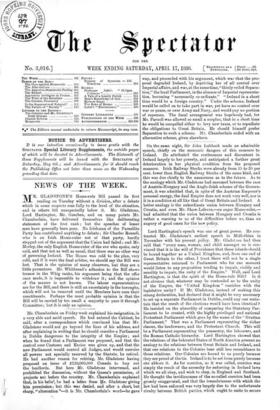Mr. Chamberlain on Friday week explained his resignation, in a
very able and acrid speech. He had entered the Cabinet, he said, after a correspondence which convinced him that Mr. Gladstone would not go beyond the lines of his address, and after explaining in writing that he should consider a Parliament in Dahlia dangerous to the integrity of the Empire ; and when he found that a Parliament was proposed, and that the control over Customs and Excise was given up, and that the new Parliament would control all Judges, and would exercise all powers not specially reserved by the Statute, he retired. He had another reason for retiring, Mr. Gladstone having proposed an issue of £120,000,000 Consols to buy out the landlords. But here Mr. Gladstone intervened, and prohibited the discussion, without the Queen's permission, of projects not before the country. Mr. Chamberlain explained that, in his belie% he had a letter from lyfr. Gladstone giving him permission ; but this was denied, and after a short, but sharp, " altercation "—it is Mr. Chamberlain's word—he gave
way, and proceeded with his argument, which was that the pro- posal degraded Ireland, by depriving her of all control over Imperial affairs, and was, at the same time, " thinly veiled Separa- tion," the local Parliament, in the absence of Imperial representa- tion, becoming "necessarily co-ordinate." "Ireland in a short time would be a foreign country." Under the scheme, Ireland would be called on to take part in war, yet have no control over war or peace, or over Army and Navy, and would pay no portion of expenses. The fiscal arrangement was hopelessly bad, for Mr. Parnell was allowed so small a surplus, that in a short time he would be compelled either to levy new taxes, or to repudiate the obligations to Great Britain. He should himself prefer Separation to such a scheme. Mr. Chamberlain ended with an alternative scheme, given elsewhere.


































